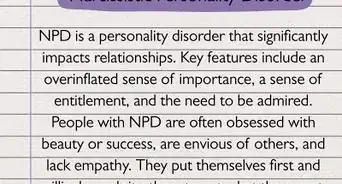This article was co-authored by Trudi Griffin, LPC, MS. Trudi Griffin is a Licensed Professional Counselor in Wisconsin specializing in Addictions and Mental Health. She provides therapy to people who struggle with addictions, mental health, and trauma in community health settings and private practice. She received her MS in Clinical Mental Health Counseling from Marquette University in 2011.
There are 8 references cited in this article, which can be found at the bottom of the page.
wikiHow marks an article as reader-approved once it receives enough positive feedback. In this case, 86% of readers who voted found the article helpful, earning it our reader-approved status.
This article has been viewed 98,727 times.
Narcissism is a form of self-regard that is overly focused on the individual. A person with narcissism is incapable of feeling empathy for others, and needs to mask their fragile self-esteem with overconfidence. In extreme cases, narcissism can be the result of Narcissistic Personality Disorder, a diagnosable condition, but not always. There are ways to identify a person with narcissism when you interact with one. Watching the way a person talks and interacts with others can help you identify whether or not they are a person with narcissism.
Steps
Watching Their Behavior
-
1Watch for a change in behavior. Most relationships with a person with narcissism will start off well. They will initially come off as friendly and confident, and seek to find ways to show that you two are similar. They really are listening to you, at least at first, because being friends with you reflects well on them.[1]
- Their pleasant demeanor may vanish when they do something that might show weakness. Rather than turn to you for support, as a friend will, they will retreat further, focusing on the special circumstances or the unique nature of their situation.
- This change may come when they think something about you changes. They will find something about you that doesn’t fit into the vision they have for you and your relationship. These differences suggest that you aren’t the same as them, making you not a good as they are.
-
2Examine the people around them. People with narcissism like to keep the focus on themselves, and so they tend to surround themselves with people who will mirror this behavior. A person with narcissism will be surrounded by people who help inflate those feelings of superiority, and rarely (if ever) challenge them.[2]
- Narcissism involves a certain emptiness, a concern that the person doesn’t live up to their own expectations. To compensate, they will like to be surrounded by admirers who tell them that they are smart, attractive, or whatever else the person with narcissism needs to hear.
Advertisement -
3Check out their social media profile. Because people with narcissism are focused on status, they use social media as a way to reinforce their position. A person with narcissism on social media will have lots of friends and a large network. They may even comment on their large network as a way to reinforce how important they are.[3]
-
4Look for short-term relationships in their past. Because they are so focused on themselves, people with narcissism tend to have very short relationships. They look for partners who will reinforce their sense of self-worth, which can be unsatisfactory to the other person. This leads to a lot of short-term relationships.[4]
- In some cases, this sense of self-worth can be expressed as infidelity. A person with narcissism will look for someone else who can focus on taking care of their needs, implying that their current partner cannot.[5]
- You can find similar backgrounds in business leaders with narcissism. They stay at companies for a short time, end up wrecking or damaging the business, then quickly move on to the next one. They will also always have an explanation or excuse for how they couldn’t have done any better.
-
5Look at their appearance. People with narcissism place a high value on good outward appearance, and they use their appearance to promote their status. They spend a lot of time working on their appearance, such as by styling their hair or choosing clothing. The clothing they choose is often flashy and expensive. Women are also more likely to wear makeup and show off their cleavage.[6]
- If you suspect a person might have narcissism, looking at the way they present themselves outwardly can be a good sign. Many people with narcissism can draw you in at first because they are trying make a good first impression.[7] [8]
- Part of the reason why people with narcissism may like expensive flashy clothing is because they use these items as a way to show off high status and improve their own status. One comparison is that a shopaholic will talk about a great deal they got on something, while a person with narcissism will talk about how prestigious the item is.
Listening to a Person with Narcissism
-
1Listen for self-references. A person with narcissism will always keep the conversation on themselves. It doesn’t matter how relevant it is to the topic, a person with narcissism will always find a story or anecdote that places them in the center of discussion. The important thing to a person with narcissism is that you and your circle of friends is talking about them.[9]
- Relevance is one key to understanding a person with narcissism’s self-reference. People will naturally try to relate conversations to personal experiences and things they understand. A person with narcissism is different because they will always look for a way to interject their experiences or perspective, even if it has nothing to do with what you are talking about.
-
2Notice a grandiose sense of self-importance. As you might expect, a person with narcissism keeps the focus on themselves and their accomplishments. People with narcissism will expect to be recognized as important, influential or superior, even if their accomplishments do not necessarily warrant it.[10]
- A person with narcissism will likely try to exaggerate their accomplishments. they will try to make themself look like the most important person in every conversation.
- Because these are exaggerations, a person with narcissism might not always be successful. If they fail at doing something, you can be sure there will be excuses or other explanations for why it didn’t work. The answer certainly won’t be an admission of fault or making a mistake. Someone or something else will always be at fault.[11]
-
3Listen for fantasies of success. It’s certainly natural to dream of being successful, but a person with narcissism will fixate on it. They will talk about unlimited success, power, beauty, or any other signal of greatness. These fantasies will be the obvious end result of the individual’s personal greatness, even if they have not done anything to deserve that.[12]
- In many cases, these fantasies will be unattainable, causing them to lash out at people who suggest they aren’t possible.
-
4Listen for authoritative statements. People with narcissism tend to avoid using “I” statements. When a narcissist makes an assertion, it is not meant to start an argument, but end conversation.[13]
- It seems counter-intuitive, but narcissists don’t want to use “I” when talking about their ideas. Beginning a statement with “I think” or “My opinion is” suggests that what they are saying may not be completely correct, or is open to critique.
-
5Listen for name-dropping. A person with narcissism will want to show how successful or powerful they are, and will make references to other famous or important people they know as proof of this. Listen for referrals to notable people, especially if they are using them as a way to show how smart or talented they are.[14]
- This is different from citing authorities to back up a position. A person with narcissism isn’t interested in providing a background for their assertions. Instead, it is about using this authority to stop conversation and get you to admit they are correct.
Watching for Narcissistic Behavior
-
1See if they can find empathy for others. People with narcissism like to show their superiority by treating those they see as weak or inferior with disdain. When you talk about other people, either specific individuals or more impersonal groups like “the poor” or “cancer patients,” see how they respond. A person with narcissism will find a way to hint, or outright say, how he doesn’t have those problems because of something he does better.[15]
- Some people with narcissism will even find pleasure in other people’s discomfort. This isn’t because they take pleasure in misfortune, but rather because it reinforces their own sense of superiority because these troubles don’t affect them.
-
2Watch for an inability to hear criticism. Nobody likes receiving criticism, of course, but people with narcissism cannot stand it. They are hyper-sensitive to the suggestion that they aren’t as great or wise as they want you to believe. Because they tend to be insecure, people with narcissism may lash out at you or become severely depressed in response to criticism.[16]
- A person with narcissism may not always lash out at you. Instead, the person might offer excuses, mentioning outside forces that made their success impossible. Sometimes they can tend towards conspiracy theories, ideas that someone else “has it out for me.”
-
3Pay attention if someone lashes out when challenged. Someone who lashes out at you if you challenge them may have narcissistic tendencies. A person with narcissism does not like weakness, especially in themselves, and will likely lash out at someone who challenges them and the things they say. Their goal will be to shame, guilt, or intimidate you into silence, which they can interpret at acceptance of their viewpoints.[17]
- Avoid challenging a person with narcissism. The result might be confrontational or even violent.
References
- ↑ http://www.huffingtonpost.com/entry/signs-of-narcissism_us_55b6a5bce4b0224d88337fee
- ↑ http://www.independent.co.uk/life-style/how-to-spot-a-narcissist-psychologist-picks-seven-ways-to-identify-narcissistic-behaviour-a6701071.html
- ↑ http://www.huffingtonpost.com/2015/08/14/signs-of-narcissism_n_4696772.html
- ↑ http://www.independent.co.uk/life-style/how-to-spot-a-narcissist-psychologist-picks-seven-ways-to-identify-narcissistic-behaviour-a6701071.html
- ↑ http://www.huffingtonpost.com/2015/08/14/signs-of-narcissism_n_4696772.html
- ↑ http://www.academia.edu/2039870/Portrait_of_a_Narcissist_Manifestations_of_narcissism_in_physical_appearance
- ↑ http://www.independent.co.uk/life-style/how-to-spot-a-narcissist-psychologist-picks-seven-ways-to-identify-narcissistic-behaviour-a6701071.html
- ↑ http://www.huffingtonpost.com/entry/signs-of-narcissism_us_55b6a5bce4b0224d88337fee
- ↑ http://psychcentral.com/disorders/narcissistic-personality-disorder-symptoms/
- ↑ http://psychcentral.com/disorders/narcissistic-personality-disorder-symptoms/
- ↑ http://www.huffingtonpost.com/2015/08/14/signs-of-narcissism_n_4696772.html
- ↑ http://psychcentral.com/disorders/narcissistic-personality-disorder-symptoms/
- ↑ http://www.forbes.com/sites/alicegwalton/2015/04/06/can-you-spot-a-narcissist-its-not-as-easy-as-you-think-study-finds/#7f0109cbe969
- ↑ http://www.huffingtonpost.com/2015/08/14/signs-of-narcissism_n_4696772.html
- ↑ http://blogs.psychcentral.com/relationships/2014/05/key-traits-of-narcissism/
- ↑ https://www.psychologytoday.com/articles/201107/how-spot-narcissist
- ↑ http://blogs.psychcentral.com/relationships/2014/05/key-traits-of-narcissism/
About This Article
Unfortunately, you can’t always escape narcissists, so it’s important to be able to identify them. Narcissism is characterized by a sense of self-importance, which ultimately comes from a place of insecurity. You can generally spot narcissists by their obsession with their image, status, and the way other people perceive them. If you notice someone is always talking about themselves and rarely shows any genuine interest in other people, chances are they’re a narcissist. Another big giveaway is their lack of empathy for other people. You’ll know someone’s a narcissist if they’re unable to deal with criticism and instead get defensive or try to blame other people for their own mistakes. For more tips from our Psychology co-author, including how to identify a Narcissist by their relationship or work history, read on!










































































